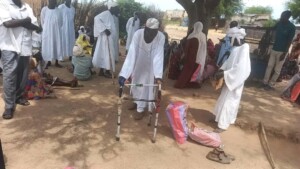Chikungunya outbreak in Sudan’s Red Sea state: 73 stricken
Sudanese medical sources have reported an outbreak of the mosquito-borne chikungunya fever in Jebeit in Red Sea state.
 Chikungunya fever is spread by the Aedes aegypti mosquito, the same kind that spreads dengue and Zika virus (File photo)
Chikungunya fever is spread by the Aedes aegypti mosquito, the same kind that spreads dengue and Zika virus (File photo)
Sudanese medical sources have reported an outbreak of the mosquito-borne chikungunya fever in Jebeit in Red Sea state.
Quoting medical sources, journalist Osman Hashim told Radio Dabanga that there have been 73 cases reported. He said that medics complain of a lack of intravenous solutions and poor health care in Jebeit.
Citizens called on the state government to speed-up intervention to curb the spread of the epidemic.
Chikungunya fever
Chikungunya fever is spread by the Aedes aegypti mosquito, the same kind that spreads dengue and Zika virus. It is characterised by an abrupt onset of fever, frequently accompanied by joint pain.
There is no specific antiviral drug treatment for chikungunya. Most patients recover fully within weeks, but in some cases joint pain may persist for several months, or even years. With older people, the disease can contribute to the cause of death.
Poor sanitation
Poor sanitation and contamination of drinking water are blamed for the spread of the mosquitoes.
As reported by Radio Dabanga in February, a government report showed more than 10,000 cases of chikungunya fever in Sudan’s Red Sea state over four months. In November 2018, Radio Dabanga reported a rise of rates of chikungunya fever infections in eastern districts of Port Sudan in Red Sea state.
An outbreak of chikungunya began in August 2018 after heavy rains hit Sudan’s eastern Kassala state and El Gash river flooded large pieces of land. In October, health sources told Radio Dabanga that the number of patients admitted to health centres and private clinics in the eastern Sudanese state was increasing. Government officials reported at the time that at least 13,400 people in Kassala were infected with the mosquito-borne disease.
Our editorial independence means that we can continue to provide factual updates about political developments to Sudanese and international actors, educate people about how to avoid outbreaks of infectious diseases, and provide a window to the world for those in all corners of Sudan. Support Radio Dabanga for as little as €2.50, the equivalent of a cup of coffee.












 and then
and then